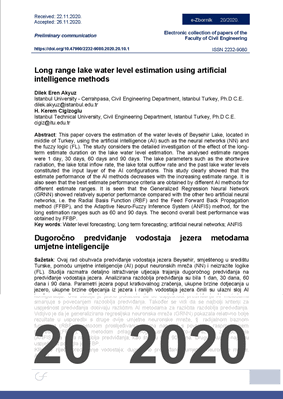ISSN 2232-9080
LONG RANGE LAKE WATER LEVEL ESTIMATION USING ARTIFICIAL INTELLIGENCE METHODS
- Issue: No. 20, December 2020, Vol. 10
- Author(s): Dilek Eren Akyuz, H. Kerem Cigizoglu
- Type: Preliminary communication
- DOI: https://doi.org/10.47960/2232-9080.2020.20.10.1
Abstract: This paper covers the estimation of the water levels of Beysehir Lake, located in middle of Turkey, using the artificial intelligence (AI) such as the neural networks (NN) and the fuzzy logic (FL). The study considers the detailed investigation of the effect of the long-term estimate duration on the lake water level estimation. The analysed estimate ranges were 1 day, 30 days, 60 days and 90 days. The lake parameters such as the shortwave radiation, the lake total inflow rate, the lake total outflow rate and the past lake water levels constituted the input layer of the AI configurations. This study clearly showed that the estimate performance of the AI methods decreases with the increasing estimate range. It is also seen that the best estimate performance criteria are obtained by different AI methods for different estimate ranges. It is seen that the Generalized Regression Neural Network (GRNN) showed relatively superior performance compared with the other two artificial neural networks, i.e. the Radial Basis Function (RBF) and the Feed Forward Back Propagation method (FFBP), and the Adaptive Neuro-Fuzzy Inference System (ANFIS) method, for the long estimation ranges such as 60 and 90 days. The second overall best performance was obtained by FFBP.
Keywords: Water level forecasting; Long term forecasting; artificial neural networks; ANFIS







